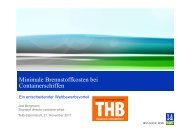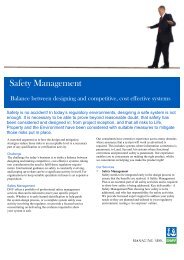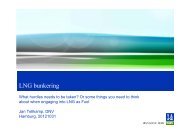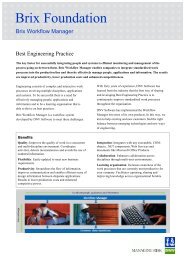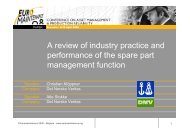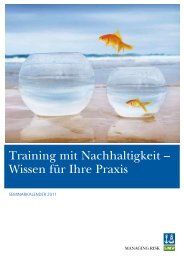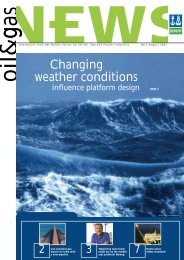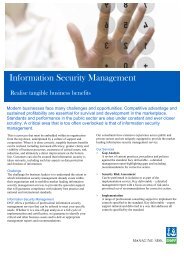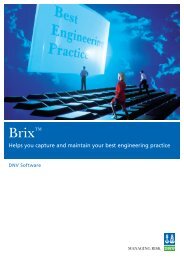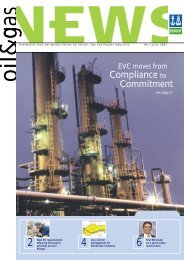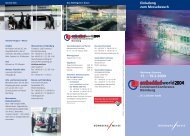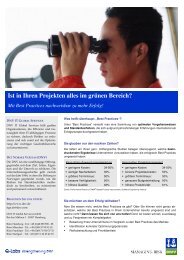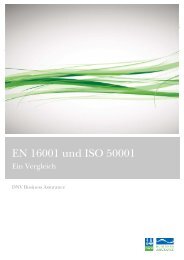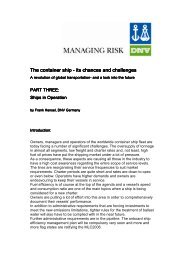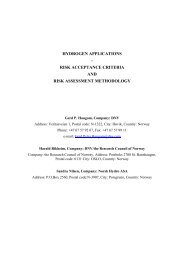EUROMAINTENANCE JOURNAL - DNV Germany
EUROMAINTENANCE JOURNAL - DNV Germany
EUROMAINTENANCE JOURNAL - DNV Germany
Create successful ePaper yourself
Turn your PDF publications into a flip-book with our unique Google optimized e-Paper software.
INTERVIEW<br />
ABOUT THE EFNMS<br />
ROLE OF SIGNIFICANCE IN THE<br />
EUROPEAN MAINTENANCE COMMUNITY<br />
Maintenance is no longer the art of keeping the machine base<br />
operational. Today, maintenance is expected to keep the equipment in<br />
optimum condition, in order to achieve the company goals, i.e., maximum<br />
asset utilization, as well as the rigorous governmental and environmental<br />
requirements. To be able to play its role in this spectrum of developments,<br />
the European Federation of National Maintenance Societies – EFNMS -<br />
actively participates in a wide range of projects, either as an organisation<br />
or through its members. Euromaintenance is one of those activities.<br />
The EFNMS, which was founded in<br />
November 1970 as a non-profi t<br />
organisation and comprises today<br />
of 21 member countries, with the objective<br />
to promote effective and professional<br />
maintenance and provide future directions<br />
regarding technology , management<br />
and processes in maintenance. To<br />
this end, agreements are made to harmonise<br />
knowledge development, policy<br />
and regulations within Europe. This is not<br />
only in the interest of the industry and<br />
globalisation, but also in the interest of<br />
the employee’s active in the sector. “All<br />
projects organised by the EFNMS are<br />
aimed at better preparing maintenance<br />
personnel at all levels, organized in the<br />
national maintenance associations, for<br />
the above-mentioned tasks and responsibilities,<br />
now and in the long term. We<br />
organise not only projects within the EF-<br />
NMS, but also at European level in close<br />
collaboration with other organizations”,<br />
says Hans Klemme-Wolff, chairman of<br />
the European organisation.<br />
Objectives and developments<br />
New developments in (maintenance)<br />
technology and in statistical methods<br />
have resulted in a new approach. We<br />
have learned to measure the condition<br />
of a component during operation and to<br />
calculate the residual life time based on<br />
statistically calculated life histories of similar<br />
equipment. However, the fi rst question<br />
to be asked in this respect is: “What<br />
is good maintenance?” Hans Klemme-<br />
Wolff: We have seen a signifi cant development<br />
in the years behind us. It started<br />
with what is also known as ‘break down<br />
maintenance’, or repair what is broken,<br />
i.e. corrective maintenance. This subsequently<br />
evolved to preventive mainte-<br />
nance, and later to ‘condition-dependent<br />
maintenance’. Maintenance has thus<br />
become an activity that can be incorporated<br />
into the planning and is therefore<br />
no longer exclusively a cost item. For the<br />
maintenance professional this means that<br />
Hans Klemme-Wolff: “Euromaintenance 2008<br />
is a unique event at a truly European level”<br />
he is no longer a ‘necessary evil’ that<br />
only costs money, but instead becomes<br />
a valuable employee who has a high<br />
degree of expertise in his discipline.<br />
This expertise will be cherished by the<br />
management.”<br />
Both the national associations – members<br />
of the EFNMS – and the EFNMS itself<br />
aim to provide the maintenance professional<br />
with the knowledge and skills that<br />
will enable him to properly carry out the<br />
‘new’ tasks. Hans Klemme-Wolff: “Studies<br />
in the fi eld of maintenance management<br />
have and are being conducted,<br />
often in collaboration with other specialised<br />
institutions. This includes the investigation<br />
of the differences between European<br />
cultures and how these differences<br />
can reinforce each other. Other projects<br />
pursued at the European level are ‘Training<br />
and Certifi cation’ projects. EFNMS<br />
has developed a curriculum vitae for<br />
training programmes at various levels,<br />
to be applied within national training<br />
programmes. In addition, we organise<br />
exams for certifi cation as ‘Professional<br />
in Maintenance’, based on standards<br />
agreed at European level. This professional<br />
certifi cate is recognised in all European<br />
countries and beyond.”<br />
All these, and many other, programmes<br />
are developed and implemented by the<br />
member associations, not only on behalf<br />
of their own members, but on behalf of<br />
the European industry. Close collaboration<br />
with universities and other educational<br />
establishments is actively pursued<br />
and stimulated. The results of these efforts<br />
will be presented at the Euromaintenance<br />
conference.<br />
Euromaintenance<br />
Euromaintenance is an initiative of the<br />
EFNMS which was fi rst organised in<br />
1972. Since then, the event has grown<br />
to become the leading biennial maintenance<br />
conference in Europe. Euromaintenance<br />
2008 looks set to become the<br />
largest event in the sector. This year,<br />
too, a Euromaintenance Award will be<br />
awarded to the most successful Maintenance<br />
Manager, active in Europe. Hans<br />
Klemme-Wolff concludes: “Euromaintenance<br />
is a unique event in that it aims<br />
to be not only a conference with presentations<br />
of high technical and scientifi c<br />
quality, but also an exhibition at a truly<br />
European level, where all participants<br />
fi nd what they are looking for”.



